|
|
|
Sort Order |
|
|
|
Items / Page
|
|
|
|
|
|
|
| Srl | Item |
| 1 |
ID:
099833
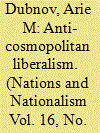

|
|
|
|
|
| Publication |
2010.
|
| Summary/Abstract |
The debate between contemporary cosmopolitans and advocates of nationalism is hardly new. Nevertheless, much of it is based on the erroneous assumption that cosmopolitanism should be seen as an outgrowth of liberalism, and that both should be considered as the complete conceptual opposites of nationalism. In this article I focus on two of the post-war Jewish anglophile intellectuals who took part in this debate during the Cold War years: the Oxonian liberal philosopher Sir Isaiah Berlin (1909-97) and the Israeli historian Jacob L. Talmon (1916-80). I use their examples to argue that the dividing line between cosmopolitans and advocates of nationalism should not be regarded as signifying the distinction between liberals and anti-liberals; in fact, this debate also took place within the camp of the liberal thinkers themselves. I divide my discussion into three parts. Firstly, I examine Berlin's and Talmon's positions within the post-war anti-totalitarian discourse, which came to be known as 'liberalism of fear'. Secondly, I show how a sense of Jewish identity, combined with deep Zionist convictions, induced both thinkers to divorce anti-nationalist cosmopolitanism - which they regarded as a hollow, illusionary ideal associated with impossible assimilationist yearnings - from the liberal idea. I conclude by suggesting that, although neither man had ever developed a systematic theoretical framework to deal with the complex interactions between ethno-nationalism, liberal individualism and multiculturalism, Berlin's vision of pluralism provides the foundations for building such a theory, in which liberalism and nationalism become complementary rather than conflicting notions.
|
|
|
|
|
|
|
|
|
|
|
|
|
|
|
|
| 2 |
ID:
099834


|
|
|
|
|
| Publication |
2010.
|
| Summary/Abstract |
The traditional distinction between civic and ethnic citizenship continues to dominate the study of citizenship concepts. In recent years, various authors have questioned the dichotomous character of these concepts. In this article, we empirically investigate the applicability of this dichotomy based on an analysis of International Social Survey Programme (ISSP) survey data across thirty-three societies. The analysis demonstrates that this dichotomous structure can indeed be detected and therefore the theoretical dichotomy can be considered as empirically valid. While ethnic citizenship refers most strongly to having national ancestry, for civic citizenship the most important criterion seems to be to obey national laws. However, the ethnic concept of citizenship can also be defined in a negative manner: for ethnic citizenship, obeying the national laws is clearly not a sufficient condition. Further analysis also reveals that the measurement of both concepts is not equivalent cross-nationally, so that findings on civic and ethnic citizenship are difficult to compare across societies.
|
|
|
|
|
|
|
|
|
|
|
|
|
|
|
|
| 3 |
ID:
099835
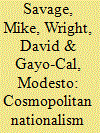

|
|
|
|
|
| Publication |
2010.
|
| Summary/Abstract |
In recent years, strong claims have been made for the breakdown of national boundaries and the reformation of national identities in an increasingly interconnected global world - driven in large part by the possibilities and limitations that emerge from an increasingly global media world. It has been argued that new postnational, cosmopolitan subjectivities accompany, enable and feed off globally oriented forms of cultural consumption. This article examines these claims in the light of unusually comprehensive data on the tastes of the white British population collected in a large national sample survey, in-depth interviews and focus groups. By identifying and analysing the geographical spread of the cultural referents of the tastes of the white British we make an empirical assessment of the claims for cosmopolitan identities. We argue that if white British identities are being reformed by processes of globalisation it is, paradoxically, in an increasingly Anglophone direction.
|
|
|
|
|
|
|
|
|
|
|
|
|
|
|
|
| 4 |
ID:
099838
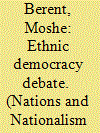

|
|
|
|
|
| Publication |
2010.
|
| Summary/Abstract |
Sammy Smooha's "ethnic democracy" model challenged the notion of the uniqueness of Israel by setting it as the archetype of a special type of democracy: "ethnic democracy". But contrary to what Smooha suggests, Israel's national identity is indeed unique. In each of Smooha's East European examples, besides the concept of a core ethnic nation, exists the notion of a civic territorial nation, which makes possible the integration or 'assimilation' into the dominant culture of those who are not members of the core ethnic nation. Yet, Israel's national identity does not recognise the existence of a civic territorial nation and makes no provisions for the integration or assimilation of non-Jews, especially Arabs, into the dominant Hebrew culture. Setting Israel as an archetype for his model prevents Smooha from exploring the possibility that, unlike Israel, East European "ethnic democracy" could be a transitional phase towards a liberal democracy.
|
|
|
|
|
|
|
|
|
|
|
|
|
|
|
|
| 5 |
ID:
099836


|
|
|
|
|
| Publication |
2010.
|
| Summary/Abstract |
Countries of immigration are generally faced with a dilemma: they wish to accept immigrants for economic purposes, but also to restrict immigration for ethnonational reasons. This is especially true in ethnic nation-states, where immigration is seen as a threat to ethnonational unity more than in civic nation-states. However, in recent decades, various ethnic nation-states have adopted immigration policies that have encouraged their diasporic descendants born and raised abroad to return to their ethnic homeland. Ethnic return migration apparently solves the immigration dilemma by providing ethnic nation-states with a much-needed unskilled labour force without causing ethnonational disruption because the immigrants are co-ethnic descendants. After comparing ethnic return migration policies in European and East Asian countries, this article analyses the development of such policies in Japan and their eventual failure to solve the country's immigration dilemma. As a result, Japan (and other ethnic nation-states) have imposed restrictions on ethnic return migration.
|
|
|
|
|
|
|
|
|
|
|
|
|
|
|
|
| 6 |
ID:
099837
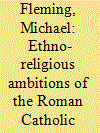

|
|
|
|
|
| Publication |
2010.
|
| Summary/Abstract |
This paper differentiates between centrifugal and centripetal aspects of ethno-nationalism to help account for the ascendancy of communism in the immediate aftermath of World War II in Poland. It argues that the directing of social antipathy to defined out-groups allowed the Polish Workers' Party (PPR) to manage social anger and that the Roman Catholic Church's ethno-religious agenda was aligned with the PPR's ethno-nationalist policy. Furthermore, it is contended that the Church's toleration of hostile actions directed at minority communities supported the PPR's management of social anger. The paper concludes that the Church, despite its manifest intentions and contrary to contemporary perceptions, played a role in the PPR's achievement of hegemony.
|
|
|
|
|
|
|
|
|
|
|
|
|
|
|
|
| 7 |
ID:
099839


|
|
|
|
|
| Publication |
2010.
|
| Summary/Abstract |
The subject matter of this study emerged from a hypothesis that the members of emigrant groups who left the Czech lands before the period of "national revival" did not have shared Czech national identity, which was created only after their departure and was transmitted to these groups within the scope of the 'protection programme for compatriots' implemented by the Czechoslovak Republic in the inter-war period. The core of the article is an analysis of the "nationalising" process of the community of Vojvodovo, a village in north-west Bulgaria founded by emigrants from the Czech lands. The main emphasis is on comparing the views of proponents of the protection programme for compatriots - who considered Vojvodovo to be a "Czech" village defined in the first place by the "Czechness" of its inhabitants - and those of the Vojvodovan, who defined themselves primarily in terms of their religion, while lacking (Czech) national consciousness.
|
|
|
|
|
|
|
|
|
|
|
|
|
|
|
|
| 8 |
ID:
099848


|
|
|
|
|
| Publication |
2010.
|
| Summary/Abstract |
This article elaborates on the concept of national reproduction as a means of analysing how national categories were redefined and adjusted in the political process that led to the establishment of the National Library of Norway. Three different forms of national reproduction may be distinguished in this process: the adjustment of cultural and territorial hierarchies within the nation-state in the 1980s; the consolidation of the national community by defining it in contrast to the "foreign" in the 1990s; and the definition by the political elite of a "new national we" that includes the "foreign" after the turn of the millennium.
|
|
|
|
|
|
|
|
|
|
|
|
|
|
|
|
| 9 |
ID:
099840


|
|
|
|
|
| Publication |
2010.
|
| Summary/Abstract |
Diaspora positions and identities are being continually constructed, negotiated and reframed. Nevertheless, many studies tend to focus on the ethno-centric, exclusionary and/or nationalistic orientation of some groups. In this article, I will explore variations in the responses of the Indian American diaspora community to Hindu nationalism in India. The article will focus on the opposition of progressive groups to a particularly controversial Hindu nationalist leader, Narendra Modi. They stand in contrast to those US-based organisations that support Modi and his political ideology. The debate between the two sides shows a high degree of political polarisation within the community. This study illustrates the variations in interpretations of nationalism and identity that exist among groups operating in the transnational political space. In particular, it shows us that the political process that articulates these differences can impact policy in the home or adopted country.
|
|
|
|
|
|
|
|
|
|
|
|
|
|
|
|
| 10 |
ID:
099846
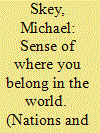

|
|
|
|
|
| Publication |
2010.
|
| Summary/Abstract |
The significance of national forms of imagination and organisation has been increasingly questioned in an era of rapid globalisation. While theoretically stimulating, those who stress the importance of global mobility and sociability sometimes overlook what well-established, "thick" attachments to the nation offer to disparate individuals, notably in terms of anchoring subjectivity. This first part of this paper explores how debates around belonging in England continue to define certain "ethnic" groups as more or less national, because they embody certain traits, practices or norms. It is then suggested that those who claim, and are treated as if, they belong "without question" may be offered a key sense of material and ontological security that is underpinned through routine practices, symbolic forms and institutional arrangements. The second section looks to evidence this argument by exploring how challenges to this ontological order, which focus on the agency of "perceived" others in relation to everyday spaces, practices and material objects, are debated and resisted.
|
|
|
|
|
|
|
|
|
|
|
|
|
|
|
|
| 11 |
ID:
099847
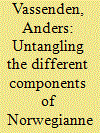

|
|
|
|
|
| Publication |
2010.
|
| Summary/Abstract |
National identity is under scrutiny in Europe. A new non-ethnic conception of the nation to replace the traditional ethnic one is needed. National identity is therefore undergoing a public reconstruction. This article is based on narratives of "Norwegianness" that emerged in a qualitative interview study of white majority Norwegians who live in multicultural suburbs in Oslo. I respond to an overlooked need to analytically untangle different components of "Norwegianness" as phenomenological knowledge, to decouple its different constituents from each other. In order to analyse qualitative data where notions of "Norwegianness" and "non-Norwegianness" are at play, their different aspects must be clarified. I identify multiple discursive oppositions that researchers ought to keep apart, and distinguish between civic aspects (citizenship), cultural aspects, and ethnic/racial aspects. I suggest that everyday notions of the national are fruitfully studied as discursive space constituted by a series of overlapping, but sometimes mutually contradicting, oppositions.
|
|
|
|
|
|
|
|
|
|
|
|
|
|
|
|
|
|
|
|
|